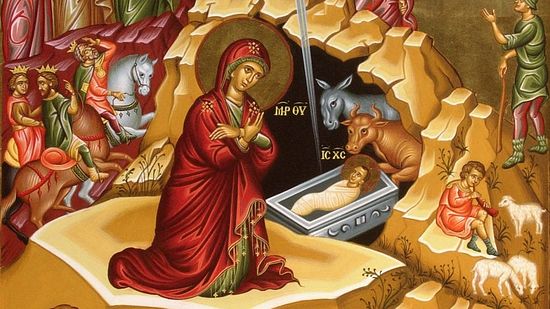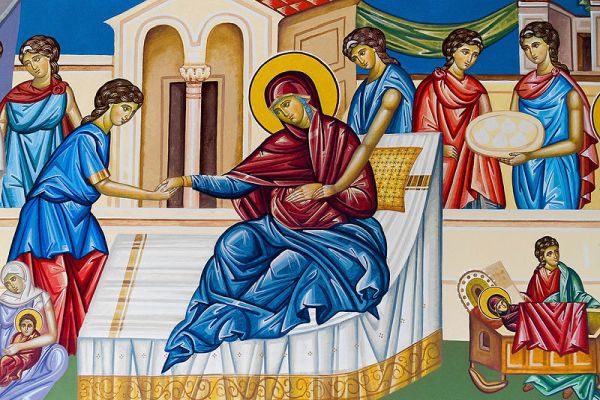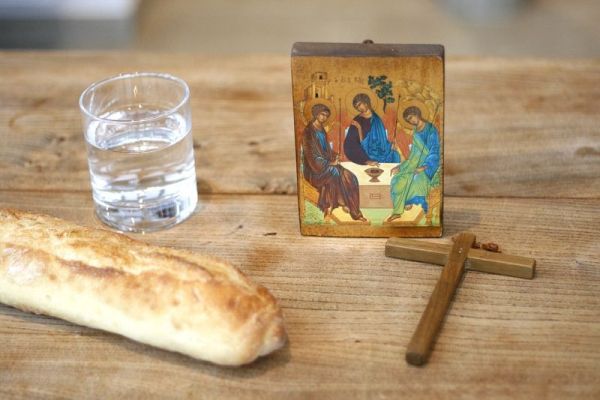The Nativity Fast
While the event of our Savior’s birth is popularly known as Christmas, Orthodox Christians prefer to call it as either the Nativity (to commemorate it as an actual historical event) or the Incarnation (to recognize it’s spiritual significance). In addition, the Orthodox Christians observe a fasting season before this great event, which is known as the Nativity Fast.
Just as the season of Great Lent helps us to meditate on our Lord’s passion and His resurrection, the Nativity Fast helps us to remember God’s mercy in sending His only begotten Son into the world for our salvation. During this fast, we prepare ourselves both inwardly and outwardly so that just like Christ became like us, we may become like Him. Though the Nativity fast is not as strict as the Great Lent in terms of it’s prescribed restrictions 1, nevertheless it is very important for our spiritual growth, which is why the Church passed it on to us..
How can we observe the Nativity Fast meaningfully? There are seven practical things we can do during this season, and to make it easier for us to remember, we have used the word ‘FASTING’ as an acronym.
F for Forgiveness.During the Nativity, we remember that our Lord Jesus Christ came into the world to save us and grant us forgiveness of our sins. As He taught us in the Lord’s Prayer, we are forgiven just as we forgive others. So it is very important that we do not harbor any bitterness against anyone during this season but instead freely forgive those who wronged us. One of the practical ways of doing this is to visit the person who has wronged you and gift him or her with a Christmas cake and a card, and pray for them.
A for Abstain. Let us, along with our families, abstain from meat and expensive food items as the Church has been doing for the past 2000 years. The Church Fathers taught us that by tempering the bodily desire for food, we will be able to temper other passions as well, so that our souls can orient more away from worldly needs and more towards spiritual needs.
S for Sharing with others who have less. Serving the poor and needy, and sharing what we have with them is our moral duty as Christians, and during seasons of fasting, this is a mandatory practice. That is one of the reasons we abstain from food – so that we can save money which can then be used to feed the less fortunate.
T for Time in prayer. Let us take as many opportunities as we can during this season to spend more time personally in prayer. If time is difficult to spare in our busy schedules, it is recommended to give up a meal once during the day or the week, and use that time for communing with the Lord.
I for Introspection. Seasons of fasting are the times when we purposefully look into our lives or introspect and repent of all our past errors and sinful ways. Of course, we have been forgiven by His mercy but walking in humility before God is always important because it reminds us that we are created from dust but made alive by His Spirit. So fasting helps us to remember that while our nature is primarily lowly and humble, whatever is holy, good and exalted within us comes from God.
N for No to the passions of our soul. As human beings, we are prone to anger, addictions, lustful thoughts etc. These are the passions of our soul that take us away from God. During the fast, let us spend time in prayer and contemplation to consider our weaknesses and practice controlling passions so that we can focus more on seeking God and His Kingdom.
G for Good News of Christ is to be shared. The Nativity season reminds us that Jesus Christ is God’s gift to the whole world, and not just for Christians. There are many today who, like the Magi, are searching for a Savior, not knowing that He came 2000 years ago. Like the angels who sang of His glory, we are called as His witnesses to tell our neighbors and friends the joyful news about His incarnation. More importantly, we should use the money that we save from our fasting and support the evangelistic activities of the Church so that more will come to know the message of the Gospel of salvation.
A note on fasting
• Opportunity vs Obligation: As with any period of fasting, the Nativity Fast should not be viewed as an obligation, but rather, as an opportunity. An opportunity to renew our commitment to our Lord Jesus Christ by practicing asceticism and restraining our bodies in order to strengthen our souls.
• Shifting our Focus: By fasting, we “shift our focus” from ourselves to others, spending less time worrying about what to eat, when to eat, how much to eat, and so on in order to use our time in increased prayer and caring for the poor.
• Fasting from sin: St. John Chrysostom rightly warned us that “he is mistaken who thinks that the fast consists only in abstinence from food. True fasting is departing from evil.” So, we must remember that while fasting from food, we are also challenged to fast from sin, from gossip, from jealousy, from anger, and from those other things which, while well within our control, we all too often allow to control us.
• The ‘heart’ of the matter: When our Lord Jesus Christ taught that “it is not what goes into the mouth that defiles a person, but what comes out of it” 2, He meant that more than our diet, we had to take care to cleanse our hearts because it is the seat of all our evil desires, so that the Holy Spirit could continue to work in and through us.
St. Basil, in his homily on the Holy Spirit reminds us of this again – “Beware of limiting the good of fasting to mere abstinence from meats. Real fasting is alienation from evil. ‘Loose the bands of wickedness.’ Forgive your neighbour the mischief he has done you. Forgive him his trespasses against you. Do not ‘fast for strife and debate…”. So as we prepare to observe the Nativity Fast, let us take heed lest we miss the whole point of the Fast that the Church has given to us for our spiritual growth.
Conclusion
The Church gave us the gift of the Nativity Fast for our benefit, that through prayer, fasting, almsgiving and repentance, we would have cleansed ourselves by God’s mercy, so that we can in purity draw closer to Christ, becoming like Him, and so reverently prepare for His Second coming into the world.
Click here to read this article in Hindi.1Traditionally, fish, meat and dairy products are avoided on weekdays, while these rules are relaxed on weekends. Persons who are ill, the very young or elderly, and nursing mothers are exempt from fasting.
2Matthew 15:11







